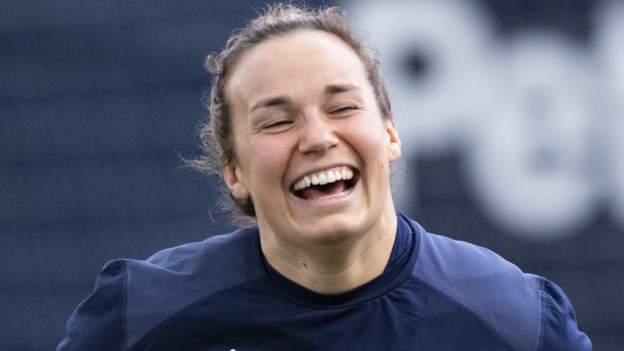
In the final game of last season's Women's Six Nations, Ireland scored in the last seconds to deny Scotland a victory they desperately craved. Four defeats out of four became five out of five, which meant a place at the foot of the table, cut adrift from the rest.
To the Scots, there was a weary familiarity about it all. They lost by a point to the Irish that day, by seven to the Italians, by five to the Welsh. At the World Cup in New Zealand, Wales beat them by three points and Australia by two. In a pre-World Cup game the USA beat them by four points. Yes, they have lost nine Tests on the spin, but there's a whole lot of nuance in there.
In the build-up to the Six Nations, with a newly professional Scotland able to dedicate more of themselves to training than ever before, they have taken steps to address those narrow losses.
Aaron Walsh, a Kiwi who is on Gregor Townsend's coaching ticket as performance coach, has been doing some work with the women's side in the area of psychology.
"There's obviously been some last-second situations where we've got it wrong and a lot of that comes down to the mental side of the game," says Scotland captain Rachel Malcolm. "It's something we definitely are crying out for as players and Scottish Rugby are listening. We've had that psychological support but it's not been specific enough.
"Also the time aspect of it. We've never had the amount of time in camp that we're now going to have. One thing we can optimise is those extra one percents."
The championship is here again and for Scotland it begins with the most difficult one of them all, away to England, the World Cup runners-up. England are so far advanced down the road in women's Test rugby compared to the Scots that this is likely to be another cricket score.
Last season England won 52-10. Before that it was 53-0, 80-0, 43-8 and 60-0. The Scottish team cannot judge the strength of their season against what happens to them this weekend. The gap is too great. But the tournament as a whole? It should be fascinating to see if they are making progress.
They are going into this game missing some hugely experienced operators. Jade Konkel-Roberts, Lisa Thomson, Sarah Bonar, Emma Wassell, Rhona Lloyd and Lisa Cockburn are all absent for injury reasons in the case of most and commitments to the GB Sevens in the case of some others. That's more than 250 caps gone from Bryan Easson's squad.
As a consequence, there are some newish names in there for the England game. Emma Orr, the outside centre from Heriot's, is 21. Meryl Smith, the University of Edinburgh inside centre, is 19. The pair of them have only 10 caps between them.
Watsonians' Francesca McGhie, another teenager, makes her debut on the wing. Coreen Grant, of Saracens, on the other wing will win only her second cap. Easson said: "It's a new World Cup loop that we're looking at, why not start them now? Why not give them that experience going into another World Cup in 2025?"
There's another uncapped player on the bench, the Harlequins centre Beth Blacklock, and three others with a combined caps total of five. This is truly deep-end stuff for the Scots against the English juggernaut.
The game is in Newcastle, the home city of the magnificent England captain, Sarah Hunter, the 37-year-old back-row who will be playing the final game of a career that's brought 140 caps, a World Cup win in 2014, two runners-up medals in 2017 and 2022, nine Grand Slams and 10 Six Nations titles. Hunter is a legend and her teammates are expected to have a frightening determination to make sure she bows out on a mighty high.
Surviving with pride intact is the main target of the Scots before some winnable matches appear on their horizon. What's beyond question is that they will never have had a better preparation going into a Six Nations.
The freedom that professionalism has brought should make them better, maybe not immediately, but in time. "It's more what they do off the field than what they do on the field," says Easson.
"To not have to train at night and get home at nine, 10, 11 o'clock and get up for work at seven in the morning… they now get a full night's sleep. They get to eat, rest and recover and that, ultimately, will make them stronger and fitter. Professionalism has really helped us."
Barring the rugby miracle to end all rugby miracles, Saturday will be a bruising experience for them, but the real examinations come after that for a new Scotland in a new era.















 Phone: (800) 737. 6040
Phone: (800) 737. 6040 Fax: (800) 825 5558
Fax: (800) 825 5558 Website:
Website:  Email:
Email: 






